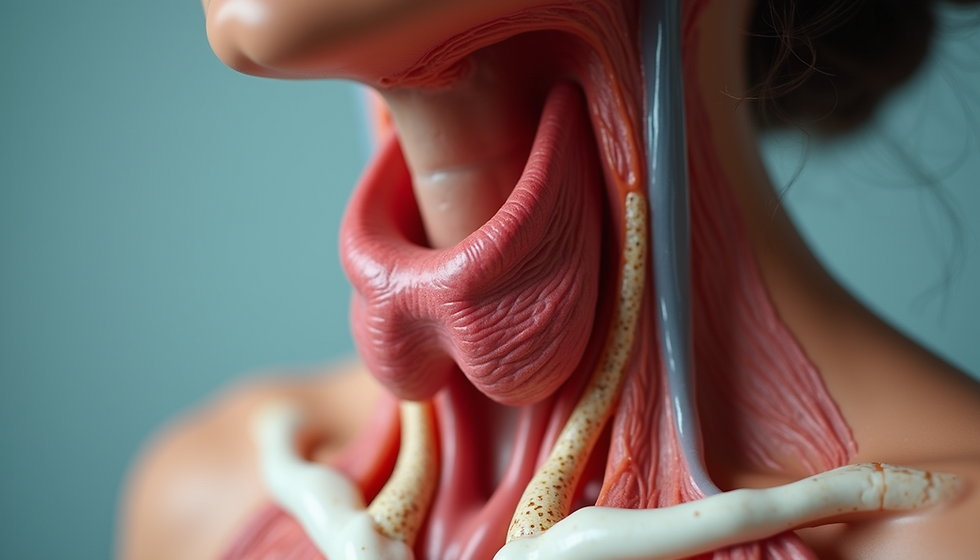When is the right time to worry about a thyroid nodule?
- Dr Texell Longoria Dubocq, MD

- Nov 17, 2025
- 3 min read
Thyroid nodules are abnormal growths in the thyroid gland that affect a large portion of the population—especially in Puerto Rico, where thyroid conditions have increased in recent years. Although most of these nodules are benign and not dangerous, there are clear signs that indicate when it is necessary to seek specialized medical attention. This article explains what a thyroid nodule is, when you should be concerned, and what steps to take for proper diagnosis and treatment.

What is a thyroid nodule?
A thyroid nodule is a lump or mass that forms within the thyroid gland, located in the front of the neck. These nodules can be:
Solid: made of tissue
Cystic: filled with fluid
Mixed: a combination of solid and fluid
Most nodules are found incidentally during imaging studies performed for other reasons, such as an ultrasound, CT scan, or MRI. In many cases, they cause no symptoms or health problems.
Signs that indicate you should seek medical attention
Although most thyroid nodules do not cause discomfort, certain symptoms and situations require immediate evaluation by an endocrine surgeon or endocrinologist. You should seek medical care if you experience:
Hoarseness or voice changes without an apparent cause
Difficulty swallowing or a persistent “lump in the throat” sensation
Rapid growth of the nodule over weeks or a few months
Discomfort or pressure in the neck that does not go away
Family history of thyroid cancer
Previous radiation exposure to the neck area, such as medical treatments or accidents
These signs may indicate that the nodule is affecting nearby structures or that there is a higher risk of malignancy.
When is a fine-needle aspiration (FNA) biopsy necessary?
A fine-needle aspiration biopsy is a simple procedure used to obtain cells from the nodule to determine whether they are benign or malignant. Not all nodules require this test.
The ACR TI-RADS system is a tool used to classify thyroid nodules on ultrasound and estimate their risk of malignancy using a scoring system based on five characteristics: composition, echogenicity, shape, margins, and presence of calcifications. Each finding adds points that group the nodule into categories ranging from TR1 (benign) to TR5 (high suspicion). The higher the score, the higher the probability of malignancy.
This classification also guides clinical decisions:
FNA is recommended for TR3 nodules ≥2.5 cm,
TR4 nodules ≥1.5 cm,
and TR5 nodules ≥1 cm,
while smaller nodules can be monitored with periodic follow-up. TI-RADS helps standardize reports, reduce unnecessary biopsies, and improve accuracy in managing patients with thyroid nodules.
FNA helps avoid unnecessary surgeries and identifies cases that require immediate treatment.
When to consider surgery?
Surgery to remove a thyroid nodule may be necessary in the following situations:
The nodule is cancerous or contains suspicious cells on biopsy
The nodule is large—generally over 4 cm—and causes compression symptoms, such as difficulty breathing or swallowing
The nodule causes persistent bothersome symptoms, such as pain or pressure
The nodule produces hormones abnormally, leading to issues such as hyperthyroidism
The type and extent of surgery will depend on the diagnosis and the specialist’s evaluation.
How is a thyroid nodule monitored?
If the nodule is benign and not causing symptoms, your doctor may recommend follow-up with periodic ultrasounds to monitor changes in size or characteristics. This ongoing surveillance is crucial for detecting any change that requires intervention.
Follow-up usually includes:
Ultrasounds every 6 to 12 months
Clinical evaluation to detect new symptoms
Repeat biopsy if the nodule grows or changes
This approach prevents unnecessary treatments and ensures proper monitoring.
Risk factors that increase concern
Certain factors increase the likelihood that a thyroid nodule is malignant or may cause complications, requiring faster evaluation:
Age under 20 or over 60
Male sex, since nodules in men have a higher risk of cancer
Radiation exposure during childhood
Family history of thyroid cancer
If you have any of these risk factors, it is advisable to consult a specialist for a thorough evaluation.
What to expect during a specialist consultation?
During the consultation, the doctor will perform:
A complete medical history, including symptoms and family history
A physical exam of the neck to assess the nodule’s size and consistency
Imaging studies, primarily a thyroid ultrasound
Thyroid function tests through blood analysis
A decision on whether a biopsy or follow-up is needed
The specialist will explain the results and treatment options based on your case.
Importance of early detection and proper treatment
Early detection and evaluation of a thyroid nodule are essential to prevent complications. Most nodules are benign and do not require surgery, but some may be cancerous or cause problems due to their size or function.
A precise diagnosis allows:
Avoiding unnecessary surgeries
Timely treatment of malignant nodules
Symptom control and improved quality of life
Prevention of serious complications
For these reasons, do not ignore symptoms or delay seeking medical evaluation if you have concerns.



Comments